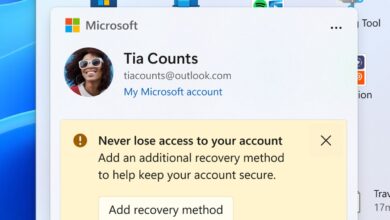Super Bowl advertisers aim for mainstream appeal with AI-focused ads

This story is part of Digiday’s annual coverage of the Super Bowl. More from the series →
Some AI brand names might sound like cadences and audibles, but the AI ads for this year’s Super Bowl have nothing to do with play calls.
This Sunday, tech giants will use Super Bowl LVIII’s mainstream audience to market new AI features. Meanwhile, other non-tech brands will air ads made with generative AI in an attempt to stand out.
Microsoft’s Super Bowl spot will promote Copilot, a flagship AI platform powering a range of features across various apps, devices and websites. In a new campaign that debuted this week, Microsoft — which recently rebranded Bing Chat under Copilot — aims to show how Copilot can be an “AI companion” across Windows, Android and Apple devices. But rather than bog down football fans with AI jargon, Microsoft’s “Watch Me” commercial shows how Copilot can help people in their everyday lives to create movie storyboards, study chemistry and write code for a new game.
In an interview with Digiday about the campaign, Microsoft Chief Brand Officer Kathleen Hall said the approach to brand messaging around AI builds on Microsoft’s strategy for marketing other categories when they still were in their infancy like the early days of PCs and cloud computing.
“AI is not some ethereal giant thing that’s housed somewhere,” Hall said. “It’s the thing that’s going to be right in front of you to do little little things that matter and that add up to big things. It’s not just these giant things you hear about like curing cancer and saving the world.”
While many Super Bowl ads aim for laughs, Hall said she didn’t think comedy would work for the Copilot campaign — at least not yet — and added the “altitude and emotional insight” in the chosen “empowering” tone “felt right.” The concept for “Watch Me” also shifted from its initial plan last spring, a few months after the AI boom began, from being about Microsoft’s corporate positioning within the AI sector to focusing more on what it will mean for people.
“Microsoft’s ad hits on every one of AI’s promises — that it will help anyone produce more, faster, and better than before,” said Forrester senior analyst Mo Allibhai. “I think it sets them up with a limited amount of time to deliver on those promises. If we don’t start seeing well publicized applications of the technology or steady improvements to the daily lives of users inside of 2024, these brands will have lost some credibility.”
High ad prices puts Super Bowl Sunday out of reach for many AI marketers. With a price tag of $7 million, a single ad for the 2024 Super Bowl costs about a fifth of what AI advertisers spent overall in the third quarter of 2023. According to Media Radar, AI advertisers collectively spent $40.2 million in the first nine months of 2023, with $35 million of that spent in just the third quarter.
AI for accessibility and cybersecurity
Microsoft isn’t the only tech giant using the Super Bowl to market AI. Google’s new ad for the Pixel 8 features the smartphone’s accessibility tools. The commercial, titled “Javier in Frame,” shows how the AI-powered Guided Frame feature helps people who are blind or that have low vision take photos and videos. The ad also was shot and directed by Adam Morse, a blind director, and narrated by musician Stevie Wonder, who is also blind.
Other tech companies are also marketing AI in various Super Bowl ads. In a Wild West-themed ad filled with robots, Crowdstrike will showcase its AI features for cybersecurity. Meanwhile, Etsy will make its debut in the Big Game to promote its recently released AI-enabled “Gift Mode” feature.
On a night filled with ads replete with celebrities and humor, some marketing experts think the tone of AI ads from Microsoft and Google will help them stand out. Charles Taylor, a marketing professor at the Villanova School of Business, said companies often focus more on product awareness when marketing new categories and less on building a brand. But with AI, the products cut across so many categories.
“Big time marketers like Google or Microsoft are in somewhat different categories,” Taylor said. “So although they overlap too, they can simultaneously teach about the products and try to build loyalty to their brand.”
Non-AI companies using AI
Rather than running a TV ad, longtime Super Bowl sponsor Avocados From Mexico opted for a digital focus. Using AI from OpenAI, a new “GuacAImole” platform generates guacamole recipes and photos based on user-uploaded ingredient images. The website also was made with guardrails in place to keep recipes brand-safe and USDA-approved: Uploaded images of inappropriate ingredients will receive a reply about the item being “unguacable.”
Despite considering an AI feature for the previous Super Bowl, the brand’s digital approach for 2024 aims to keep the focus on the brand and leave the tech behind the scenes. Texas-based agency 270B, which built the website, also removed names and images from other brands when training the tool. “[AI] was a last-second thought last year and this year it was the first thing we wanted to go out with,” said 270B CEO Kristian Bottini.
“Usually the commercial is the shining object because you spend so much money on it,” Bottini said. “You want it to shine. And this year, without a commercial, we needed digital to shine.”
After the 2022 “Crypto Bowl,” AI is already generating credibility
In some ways, the plethora of AI-infused ads bring to mind another not-too-distant Super Bowl tech trend: The wave of crypto commercials in 2022 that led to the game being dubbed the “Crypto Bowl” before the subsequent downturn of the asset class. However, marketing experts point out there are plenty of differences. For example, generative AI is already being used in numerous applications and isn’t tied to speculative markets like crypto.
“Crypto was always somewhat radioactive as an unregistered security, and big tech and multinationals were slow to adopt,” said Forrester’s Allibhai. “Generative AI is in much the opposite position, where big tech and multinationals are making enormous bets on an AI-driven future, and are now faced with building the same levels of enthusiasm in consumers.”
Are AI companies at risk of repeating crypto’s marketing mistakes by overpromising too fast and potentially underdelivering? Not intentionally, but maybe unconsciously. However, Hall said Microsoft is doing what it always does for each type of tech. They ask: “‘Why does the average person care?’”
“I think that’s where crypto missed,” she said. “I don’t think we looked at that and compared ourselves to that and said, ‘Let’s do it better.’ We kind of just did our normal playbook, which is be rooted in a meaningful truth.”
https://digiday.com/?p=534496


